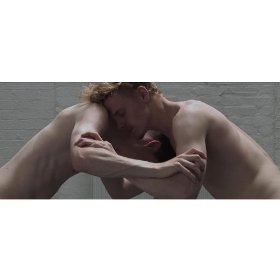The Irrepressibles’ singer and composer Jamie McDermott will draw inevitable comparisons with Antony Hegarty and Rufus Wainwright, and not just because he sings unapologetically about his homosexuality (and why should he need to apologise?) or because his music is generally designated as belonging to the "chamber pop" genre ("chamber pop", really? I might be bloody juvenile, but I can’t believe people can say that with a straight face). No, the comparisons will mostly stem from McDermott’s staggeringly beautiful voice, one which mirrors Wainwright’s for technique and Hegarty’s for emotional power.
When I saw McDermott performing in David Toop’s Star-Shaped Biscuit opera at Snape Maltings, his voice was an aspect that, for me, defined the entire show, and his classical training shone like a beacon of dexterity. Nude‘s lead single ‘Arrow’, meanwhile, is a perfect, and irresistible, demonstration of this prowess in a pop context. On the surface, ‘Arrow’ is a straight-ahead pop song, somewhat in an Elton-John-meets-Antony style, and one this writer wouldn’t normally go for, as I’m generally wary of pop ballads that start with nice string arrangements and ambulating piano melodies and build into a grandstand climax. I’ve just heard too many of them. But McDermott’s brave and frank exploration of gay sexuality ("Our bodies entwined") and homophobia ("When you were the age 15 / they shot the arrow at you"), combined with his voice, transcend the familiar archetypes to stretch into territory that may not be 100% new, but contains such emotional potency that it left me with goosebumps. Jamie McDermott’s voice scales improbable heights, from a husky low moan to a glorious falsetto, with such control that each note is pitch perfect. In anyone else’s hands (except maybe Antony’s), ‘Arrow’ might seem maudlin or predictable. With Jamie McDermott singing, however, it becomes a dramatic and emotionally affecting paean to troubled love, and a single that deserves to become a smash hit.
Despite its "chamber pop" tag, Nude is a remarkably varied and unpredictable album, veering from the hushed instrumental opener ‘Time Passing’ to the driving dance-pop gloss of ‘The Ship’, with its 4/4 beats and singalong chorus. Whilst mostly employing strings and piano, the musicians also pick up guitars, percussion and synths, all in the service of McDermott’s singing. Whilst this eclecticism sometimes undermines the whole (although not to the extent of Wainwright’s most recent albums), at times the results border on the spectacular. ‘Tears’ features twice, first with a languid "prelude" based around McDermott’s anguished moan and soothing choir samples, followed further into the album by a stomping, almost dancefloor-based reprise straight out of a Pet Shop Boys album. The song is centred on a touching lyrical leitmotiv: "Tears of a clown". It’s a familiar image, that of the heartbroken court jester, but in a gay context it seems to convey even greater significance. I for one, during my teenage years, would compensate for my lack of "proper" masculine traits by clowning around and making jokes, to hide inner conflict. The contradiction between the track’s infectious melody and these mournful undertones is striking.
But, as with Antony Hegarty, McDermott’s singular vocals find their greatest range on the numerous ballads that pepper the album, from ‘Pale Sweet Healing’ and its slowly-building gravitas and dramatic finale, to the restrained orchestral soul-bearing on ‘Two Men In Love’. The album’s apex, apart from ‘Tears’ and ‘Arrow’, however, is surely ‘New World’, a song that builds and builds from a quiet intro into a soaring, heart-rending gale of subtle electro textures, melancholic piano runs and sweeping strings. Comparisons become almost moot by this stage, but the closest I can think of would be a cross between ‘Why’-era Annie Lennox and the crisp electronic balladry of OMD’s ‘Joan Of Arc’. And I’m not even close, really. As ever, McDermott sails alongside and above the melody, reaching astounding levels of emotive strength as the song builds to its heady climax. It’s the track on which his ululations, moans and cries fly closest to the see-sawing sonic bliss I witnessed at Snape Maltings.
Nude will probably not appeal to all listeners. It’s very overwrought, sometimes confusingly eclectic, and even in these enlightened times I can imagine some listeners will be put off by the "gay" content. I also think The Irrepressibles must be even more spectacular live. These songs seem to fit a live format more than a studio. But its strengths far outweigh any minor quibbles and inconsistencies, mainly because McDermott has a voice that few can match. That he’s also capable of flourishing expressive turns of phrase and arrangements is like icing on an excessive, yet arresting, cake.


